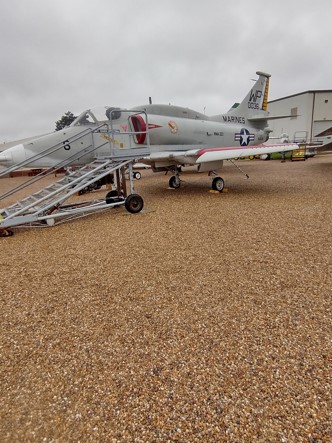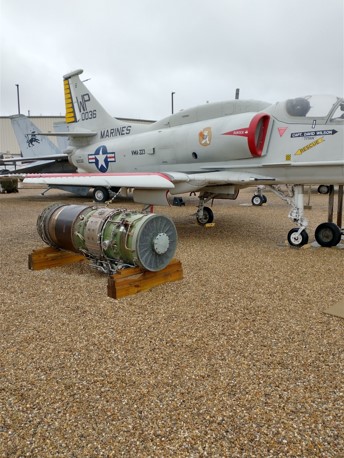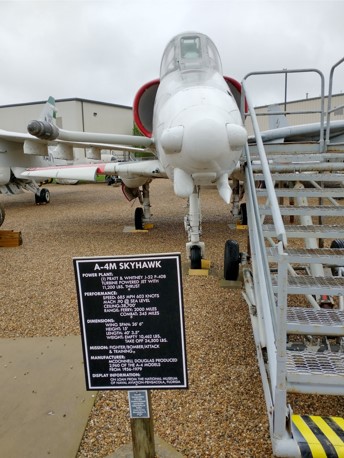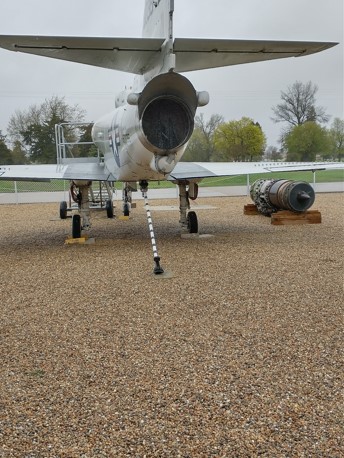Aircraft’s Background
 Prairie Aviation Museum member, LT. COL. Chuck “Dutch” Sprietsma (Retired USMC), flew this very aircraft B/N 160036 during his time in service. He was stationed at Cherry Point,NC and flew in squadron VMA-223. We have restored this static aircraft to his old squadron. His son is currently a CAPT in the Marine Corps and flies the F/A-18 Hornet.
Prairie Aviation Museum member, LT. COL. Chuck “Dutch” Sprietsma (Retired USMC), flew this very aircraft B/N 160036 during his time in service. He was stationed at Cherry Point,NC and flew in squadron VMA-223. We have restored this static aircraft to his old squadron. His son is currently a CAPT in the Marine Corps and flies the F/A-18 Hornet.
Another member of our museum, MAJOR David “Titan” Wilson (Retired USMC), also flew the A-4M Skyhawk during his time in service. MAJOR Wilson flew in squadron VMA-331 and his aircraft is on display at a museum in Virginia. Both pilots have been active in the restoration of our aircraft and during our research agreed to share their names on our A-4M. LT COL Chuck Sprietsma’s name is on the left side of the aircraft and MAJOR David Wilson’s is on the right side of the aircraft.
This aircraft, A-4M SKYHAWK, on loan courtesy of:
the National Naval Aviation Museum at Pensacola, Florida.
BUREAU/SERIAL # 160036 NNAM ACCESSION # 1999.258.001
Interactive Display
Click on a colored PIN to display additional information (text, video, recording, images).
This feature is an extra benefit as you walk around the display in our Airpark.
WIFI is provided for your mobile device. A network QR code or name/password is provided at the desk.














Videos of Interest
Video #1: A-4 Skyhawk Walkaround Run Time (0:59:02)
Video #2: The BEST A-4 Skyhawk Compilation EVER!!! Run Time (0:02:57)
Video #3: Douglas A-4 Skyhawk | Flying Through Time Run Time (0:24:03)
Video #4: Douglas A-4 Skyhawk Light Attack Aircraft Run Time (0:08:34)
History
The A-4M was a version of the Skyhawk specifically designed to fulfill a Marine Corps requirement for an attack aircraft which could fly close air support from short air strips close to the front lines. It was selected over the Ling-Temco-Vought A-7.
The A-4M was powered by a new version of the J52 engine, the J52-P-408, rated at 11,200 lbs, which was 20 percent more powerful that the earlier J52-P-8A. The higher thrust of this engine markedly improved the short-field performance. The new engine was only one percent heaver and had no increase in specific fuel consumption. In addition, smokeless burner cans were installed to reduce the amount of visible engine exhaust. In addition, a self-contained engine starter was provided, and the electrical power generating capacity was increased by 60 percent.
Authority to proceed with the A-4M was granted in May of 1969. Two A-4Fs (BuNos 155045 and 155049) were reworked into A-4M configuration at the factory to serve as prototypes. The first aircraft was flown on April 10, 1970 by test pilot Walt Smith.
During the ten-year production run of the A-4M, significant improvements were made. Among these was a new heads-up cockpit display. A Hughes Angle/Rate Bombing System (ARBS) was installed which featured both television and laser tracking modes. The sensor package included a television camera and a laser spot tracing system to provide for acquisition and tracking of laser-designated targets. On either side of the nose sensors was an antenna for the ALR-45 radar warning system. Another antenna for the ALR-45 radar homing and warning system was fitted to the top of the vertical fin. Below the nose was an antenna for an ALQ-126 deception jammer transmitter and receiver system.
A total of 160 A-4Ms were built (including the two revised A-4Fs). The final A-4M was delivered on February 27, 1979 to VMA-331, bringing Skyhawk production to an end. At the time, this was the longest production run for any American tactical aircraft–27 years.
ROLE: Single-seat light attack and ground support aircraft, both land and carrier based.
Crew: One
Bureau Number: 160036
PERFORMANCE
Maximum Takeoff Weight: 24,500 pounds
Maximum speed: 673 mph.
SPECIFICATIONS
Engine: One Pratt & Whitney J52-P-408 turbojet
Wing Span: 27 feet 6 inches
Length: 41 feet 3 inches
Height: 14 feet 11 inches
Empty Weight: 10,465 pounds
Armament: Up to a maximum of 10,000 lbs of external stores. Weapons that can be deployed include nuclear or HE bombs, air-to-surface rockets (Zuni and 2.75 FFAR), Sidewinder infra-red missiles, Bullpup and Walleye air-to-surface missiles, and Mk 4 gun pods. Two 20 mm MK 12 cannon in the wing roots are standard, each with 200 rounds.
Aircraft’s Previous Duty Station
A-4M Skyhawk
Bureau Number :160036
Nov-76 Accepted at NPRO Long Beach
Apr-76 NARF Pensacola
Jun-79 MCAS Cherry Point VMA-223
Apr-80 MCAS Yuma VMA-223
May-80 MCAS Cherry Point VMA-223
Jan-81 NAS Pensacola VMA-223
Mar-81 MCAS Cherry Point VMA-223
Jun-81 MCAS Iwakuni VMA-223
Jun-81 MCAS Cherry Point VMA-331
Oct-81 MCAS Yuma VMA-331
Nov-81 MCAS Cherry Point VMA-331
May-82 MCAS Iwakuni VMA-33
Jan-83 NAS Atsugi VMA-223
Jan-83 MCAS Iwakuni VMA-223
Mar-83 AFB Kadena VMA-223
May-83 MCAS Cherry Point VMA-223
Oct-84 NAS Pensacola VMA-223
Nov-84 MCAS Cherry Point VMA-223
May-87 NAS Memphis MAG-42 Det.
Feb-94 NAS Memphis MAG-42 Det. A (last known assignment)
Squadron Names:
VMA-223 Bulldogs
VMA-331 Bumblebees
MAG-42 Marine Aircraft Group Forty Two
